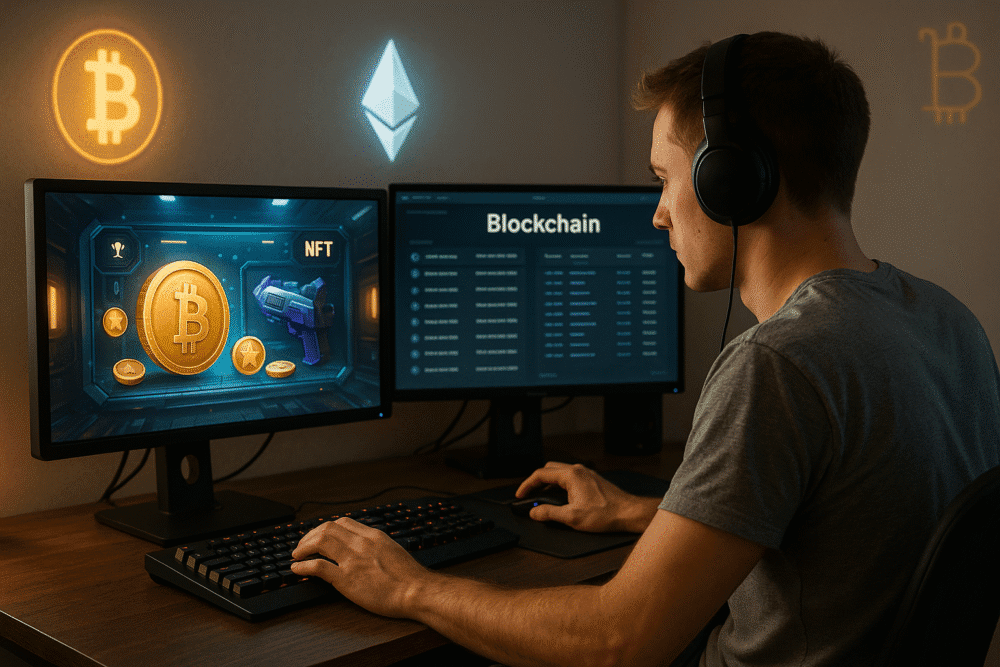Sponsored:
Online gaming is no longer just about graphics and multiplayer modes. In 2025, blockchain and crypto are reshaping how players own items, how rewards work, and how trust is built in digital games. Below is a breakdown of the key changes, the risks, and how different platforms are adapting to this shift.
What Blockchain Adds to Gaming
Blockchain introduces several technical and economic features into gaming. The most important is true ownership: in-game items, skins, or even virtual land can belong to players as tokenized assets on the blockchain. This makes trading possible without middlemen and ensures that players don’t lose items if a game shuts down. Another advantage is transparency. Smart contracts make rules around drop rates or rewards visible and verifiable, helping reduce manipulation. Finally, Play-to-Earn models have opened the possibility of earning tokens while playing. Players can complete tasks, win matches, or contribute content and then convert or trade their earnings.
Recent data shows the global blockchain gaming market in 2024 was about USD 13 billion, and projections place it at over USD 300 billion by 2030. The annual growth rate between 2025 and 2030 is expected near 69%.
Real-World Examples and a Note on Plinko Casino
To see the changes in action, consider what happened in 2025. In the second quarter alone, dozens of Web3 games shut down because they couldn’t secure enough players, funding, or maintain stable token economies. At the same time, mobile platforms gained strength. More than 70% of blockchain titles now launch for phones and tablets, showing how developers seek wider reach and lower entry barriers.
Among the platforms active in this space is Plinko casino. It is part of the online gaming ecosystem that uses blockchain or crypto payments for wagers and rewards. Players interested in alternative formats pay attention to such venues because they may offer fast payouts, provable fairness, and different mechanics than traditional casinos.
Benefits and Challenges
The appeal of blockchain gaming often comes down to three points. First, decentralized trust gives players confidence, since they can audit the rules themselves. Second, interoperability allows some items or tokens to move between games or marketplaces, extending their value. Third, new earning paths create opportunities for both casual and competitive players to benefit financially from their time in-game.
But there are serious challenges too. Volatility in token prices means a game’s economy can collapse quickly if its coin loses value. Regulations add another layer of risk, as some governments are banning or strictly controlling money-based online gaming. Retention is also a problem: many games launch with hype but fade when rewards shrink. And on a technical level, high fees and slow confirmations on popular chains can make gameplay frustrating.
How Players Can Choose Wisely
Not every blockchain game or crypto casino is reliable. Before committing time or money, users should weigh factors such as tokenomics, audits, and compliance. A project where rewards are poorly balanced or contracts are not verified poses risks. Platforms operating without regard to local laws can also expose users to fines or sudden shutdowns.
When evaluating options, consider these points:
- Transparent rules around rewards and drop mechanics
- Clear communication and consistent developer updates
- Low transaction fees and efficient technical setup
- Positive reputation backed by audits and community feedback
Games and casinos that check these boxes tend to provide more stability and reliability than those that don’t.

Current Trends
Recent numbers highlight both growth and stress in this space. Gross gaming revenue from crypto casinos reached USD 81.4 billion in 2024, a steep rise compared to earlier years. At the same time, regulators are tightening control. For example, India passed a bill banning money-based online games, forcing some apps to shut down or restructure. Investor funding for Web3 projects has also become selective, with many teams unable to raise money if they lack strong retention or sustainable models.
Risks Specific to Crypto Casinos
Because crypto casinos combine gambling with digital assets, they carry extra risks. Players may face little protection if disputes arise. The anonymity that attracts some users can also hide unfair practices. And since crypto values fluctuate, winnings can lose real-world value quickly. For safer experiences, players often look for platforms that are licensed, transparent about odds, and able to show independent audits.
Blockchain is reshaping online gaming around ownership, new earning models, and transparency. While benefits like asset control and provable fairness are appealing, risks such as volatility and uncertain regulation remain significant. For players and developers alike, recognizing both the opportunities and pitfalls is necessary for informed decisions.
–
Sponsor, Gambling, and Crypto Disclaimer:
The content in this article is for informational and educational purposes only and does not constitute financial advice, investment guidance, or an endorsement of any gambling or blockchain gaming platform. Respect My Region (RMR) does not operate, facilitate, or promote any form of online gambling or crypto wagering.
References to crypto casinos, gaming platforms, or blockchain-based games are included strictly for editorial coverage of industry developments. Readers are responsible for complying with all applicable local, state, and federal laws before participating in any online gaming or digital asset activity.
Respect My Region may receive affiliate commissions, sponsorships, or other compensation from brands or platforms mentioned in this article. These relationships do not influence our editorial opinions, coverage, or recommendations. All sponsored content and partnerships are disclosed in compliance with FTC 16 C.F.R. §255 guidelines.
Participation in online gambling or crypto gaming is restricted to adults 21 years of age or older (18 where permitted). Always verify platform licensing, regional legality, and responsible gaming measures before participating. Cryptocurrency values are volatile and may result in financial loss.
If you or someone you know may have a gambling problem, contact the National Problem Gambling Helpline at 1-800-522-4700 or visit www.ncpgambling.org for free, confidential support.
By reading this article, you acknowledge that Respect My Region is not liable for any losses, damages, or outcomes related to third-party platforms, token value fluctuations, or promotional offers referenced herein. Always play responsibly.







